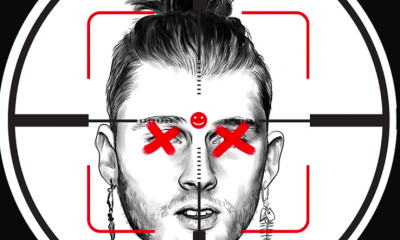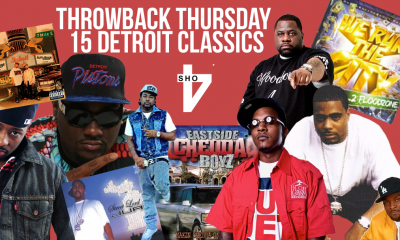Features
Eminem’s Controversy Doesn’t Cut It In 2018
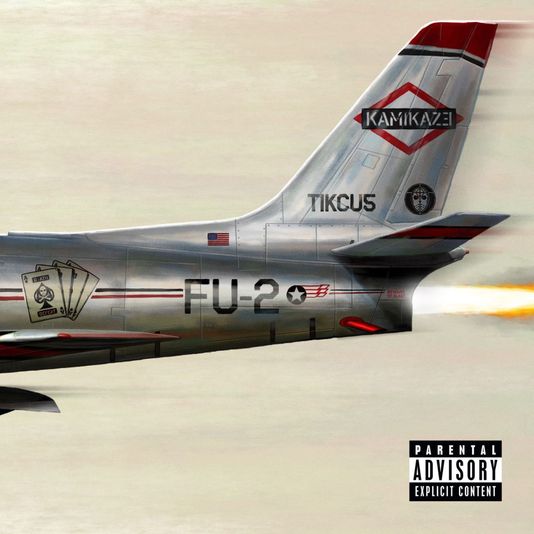
Eminem, one of Detroit’s biggest rappers, built his early career out of being the most controversial emcee on the block. Dating back to “Hi, My Name Is” in 1999, Em, aside from being a more than competent lyricist, has relied on shock value to sell his bars. In less turbulent times, his aesthetic was passable. Fans ate up his tongue-in-cheek lyricism while he spat homophobic bars and generally insensitive quips that made listeners laugh and cringe at the same time.
But over time, the world has become more sensitive and culturally correct. The “faggots” and “retards” that comprised his earliest cuts simply aren’t accepted. Seemingly coinciding with the changing cultural tide, Eminem’s own journey into the soul has been comprised of maturation. Relapse, Recovery, and Revival, three of his albums in the early to late 2000s, chronicled his exploration of self, deterring away from the harsh attempts at controversy. Marshall Mathers 2 hinted at the maturity he was brandishing being inauthentic, but, if anything, his new album Kamikaze confirms it.
On a surface level, Kamikaze is good. There’s the standard Em; throwing shots with clever, borderline genius, oodles of wordplay and a general sense of “I don’t give a fuck” lurking behind each and every bar. But the controversial aspect that made his early albums pop has returned. In light of contemporary cultural sensitivity, it sounds more awful than ever. On “Fall,” the project’s most discussed track, Em raps “Tyler create nothing. “I see why you call yourself a f*****, bitch.” It sounds as harsh reading it as it does when he raps it.
Now throwing casual shots isn’t a big deal; Em has a bone to pick with nearly everyone in hip-hop. But the casual homophobia just doesn’t work like it did at the inception of his career. It wasn’t fine then, it’s even worse now. It just won’t cut it in 2018. There’s no way to slice it.
Listen to Eminem’s latest below.
Artist To Watch
Jursula’s Journey to ‘I’m Running Away’ – A Transformative Rendition of Kanye West’s ‘Runaway’

In the realm of music, inspiration often strikes in the most unexpected places, weaving a narrative that resonates deeply with both the artist and their audience. For Jursula, the journey to creating “I’m Running Away,” a reimagined rendition of Kanye West’s “Runaway,” was nothing short of transformative, fueled by a series of serendipitous encounters and personal revelations.
The genesis of “I’m Running Away” can be traced back to a chance encounter at an airport, where Jursula found herself drawn to the haunting melody of a piano rendition of Kanye West’s iconic track. As she approached the musician, little did she know that this moment would mark the beginning of a profound musical odyssey.
“I first consciously heard it on my way from Africa to LA,” Jursula recalls, reflecting on the pivotal moment that sparked her creative journey. “Someone was keying it into a piano at the Airport in New Jersey as I was going to get to my flight. I stopped to ask him what he was playing, and he told me it was a Kanye West song.”
For Jursula, who had always admired Kanye’s artistry, hearing the reimagined rendition of “Runaway” was nothing short of revelatory. “I thought Kanye was an out-of-this-world genius before, but this song instantly made me see him on a whole new untouchable God level as he claims to be,” she shares, highlighting the profound impact of the music on her perception of the artist.
However, the journey from Africa to America took an unexpected turn when Jursula was informed that her flight was bound for the Dominican Republic instead of her intended destination, LAX. Despite the setback, she found solace in the vibrant atmosphere of the airport, indulging in the simple pleasures of a classic American burger amid the chaos of travel.
It was amidst this backdrop of uncertainty and introspection that Jursula found herself drawn to the familiar strains of Kanye’s “Runaway,” echoing through the corridors of the airport. “Something in me just knew, it was something raw,” she recalls, recounting the moment she decided to freestyle over the instrumental, capturing the raw emotions of her journey in a spontaneous burst of creativity.
As she poured her heart out in the impromptu freestyle, Jursula found herself grappling with a tumultuous mix of emotions, from the pain of a broken relationship to the exhilaration of embarking on a new chapter in her life. “I was crying both of sadness and joy during the freestyle to the point I didn’t even know what I was saying anymore,” she admits, reflecting on the cathartic release of expression.
For Jursula, “I’m Running Away” became more than just a song; it was a testament to resilience, empowerment, and self-discovery. “It was such a release song for me. I felt ascended, empowered, and free to not needing anyone,” she shares, embracing her newfound independence with unwavering determination.
As she continues to navigate the complexities of the music industry, Jursula remains steadfast in her commitment to authenticity and self-expression. “I want to do crazy things like Michael Jackson did, go to India to learn balance, yoga for performances,” she reveals, highlighting her insatiable hunger for growth and exploration.
With “I’m Running Away,” Jursula invites listeners into a world of vulnerability and strength, where every note serves as a testament to the transformative power of music. As she blazes a trail of her own, Jursula’s journey is a reminder that inspiration can be found in the most unexpected places, shaping the course of our lives in ways we never imagined possible.
Artist To Watch
BraveSoull Arrives With An AfroBeats Fusion “Hate Me Now”

In the colorful and ever-changing world of Afrobeats, a genre-hopping artist emerges with a single that not only captures the essence of the movement but also reinvents it, offering listeners a musical experience that knows no boundaries. BraveSoull and his resonating new release, “Hate Me Now,” brings tradition and innovation together.
Unveiling the Artistry of “Hate Me Now”
Since “Hate Me Now” made its seismic arrival, the effects are still being felt. The record, which is accompanied by a visually stunning music video, has shed new light on the season, infusing the scene with a dynamic blend of Afro rhythms and powerful, trap-inspired sounds that are nothing short of captivating.
BraveSoull, the trailblazing artist behind this amazing audio, is no stranger to the spotlight. His earlier works were defined by an unwavering creative vision, and “Hate Me Now” builds on that tradition with an extra layer of grit and glory. It displays the artist’s artistic development and capacity to both celebrate and transcend the genre he represents.
The Fusion of Past and Present
At its core, “Hate Me Now” is a modern take on Nas’ legendary hit of the same name, a 90s Hip-Hop track that features Puff Daddy which resonated deeply with a generation and is now given fresh life in a universe of Afrobeats by BraveSoull. This blend of past and present is more than just an homage; it is a revamping that pays homage to its origins while boldly venturing into unexplored territory.
In fact, the trendy track’s throbbing tempo, underlined by hard-hitting percussion and complex instrumental layers, sets the setting for BraveSoull’s lyrical talent. His delivery is nothing short of powerful, with words that pierce the air like a hot blade, delivering a message of strength and resistance. The song, which is both powerfully raw and precisely composed, addresses individuals who have been doubted and bruised by life’s storms, resonating with universal themes of empowerment and self-belief.
For a new generation looking for a voice that expresses their struggles and goals, BraveSoull stands up to the plate with a signature sound all of his own. His refusal to compromise, unwavering pursuit of authenticity, and dedication to his craft are evident in every note, making “Hate Me Now” an essential addition to any playlist.
In an age when mass production and commercial formulas frequently eclipse the essence of art, BraveSoull’s solid spirit is a breath of fresh air. His music serves as a reminder that, beyond the layers of production and performance, a song’s heartbeat is its soul, and “Hate Me Now” has plenty of it. For now, get familiar with this trailblazing talent here at 4Sho Magazine! Lastly, let us know your thoughts in the comments!
CONNECT WITH BRAVESOULL ON SOCIAL MEDIA:
INSTAGRAM | APPLE MUSIC | SPOTIFY | YOUTUBE
Artist To Watch
OnlyJahmez Heads To SXSW

OnlyJahmez is on the rise in the music scene, and he’s not slowing down anytime soon. His hit “Thug” has been catching ears and eyes, racking up over 143k views on YouTube. That’s a clear sign his sound is resonating with people, marking a high point in his journey this year.
But the excitement doesn’t stop there. OnlyJahmez is gearing up for something huge – he’s heading down to Austin, Texas, for the South by Southwest (SXSW) festival. This event is a big deal in the music world, a melting pot of music, film, and interactive media where artists from all corners come to showcase their talents.
SXSW 2024 is buzzing with anticipation, set to feature more than 350 artists, including OnlyJahmez. Being part of this lineup is a testament to his rising star, offering him an incredible platform to share his music with new audiences and connect with other artists and industry pros.
OnlyJahmez’s journey to SXSW and the success of “Thug” highlights a pivotal moment in his career. It’s about more than just music; it’s about making an impact, telling stories that people can connect with, and stepping into the spotlight on some of the biggest stages. As OnlyJahmez prepares to take on SXSW, fans and new listeners alike are in for a treat. It’s an opportunity for him to showcase his talent on a grand scale and for us to witness the ascent of a music star in the making.
Instagram – https://www.instagram.com/onlyjahmez/
TikTok – https://www.tiktok.com/@onlyjahmez_
-

 Artist To Watch6 days ago
Artist To Watch6 days agoBermudaCal’s Music Video Mastery takes centerstage leading up to new album “The Divinity of Doubt”
-

 Audio6 days ago
Audio6 days agoWest Coast R&B Artist Dre Hill Releases His Highly Anticipated Album “On The Road”
-
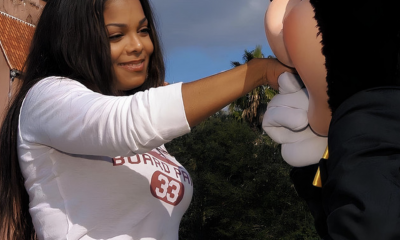
 Audio2 days ago
Audio2 days agoPhilly’s Dell Corcetti Shares Melodic New Song “Priceless”
-
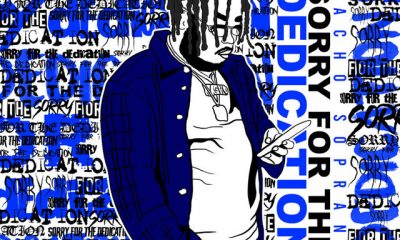
 Audio2 days ago
Audio2 days agoNacho Soprano Shares “Mode”
-

 Music Videos2 days ago
Music Videos2 days agoAnn-Derie Releases “Maximum Capacity”



